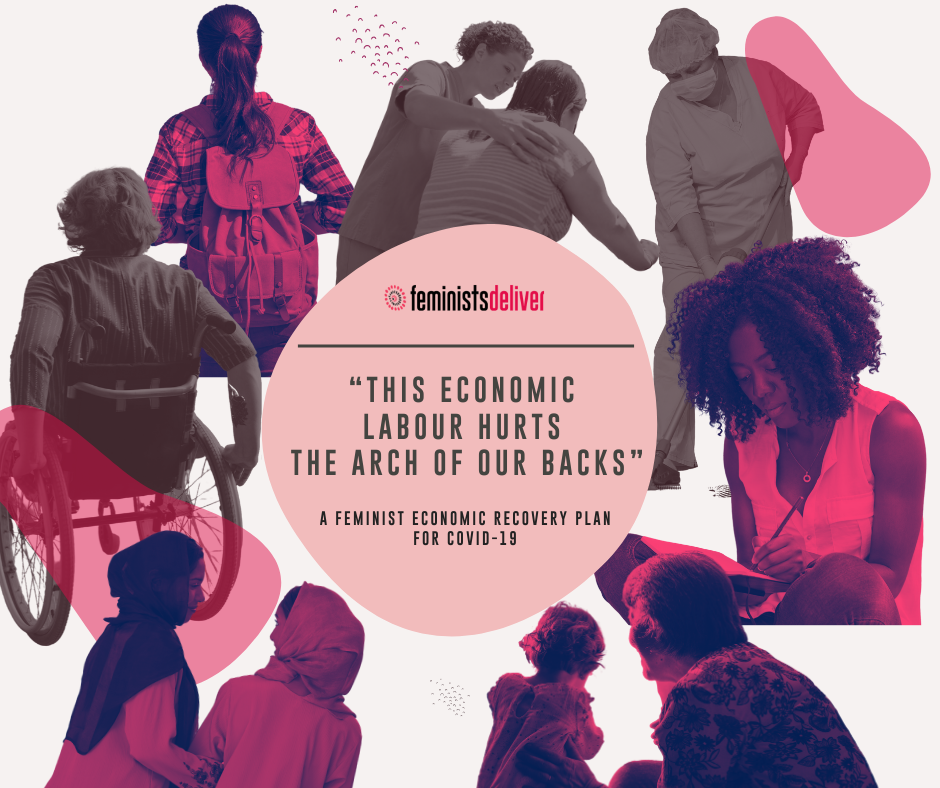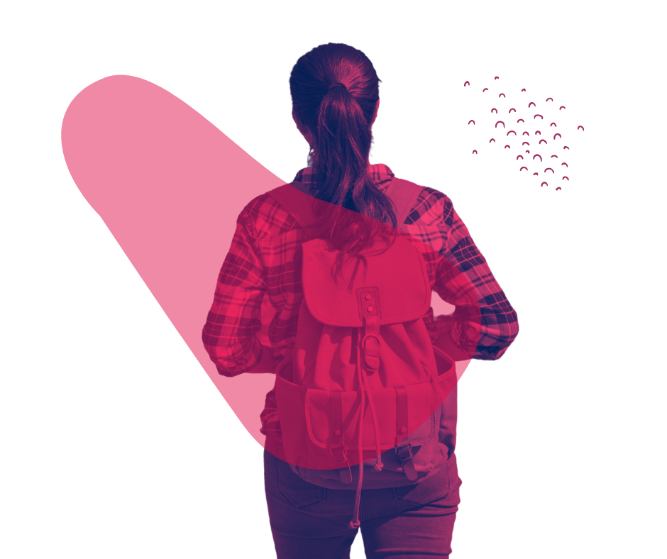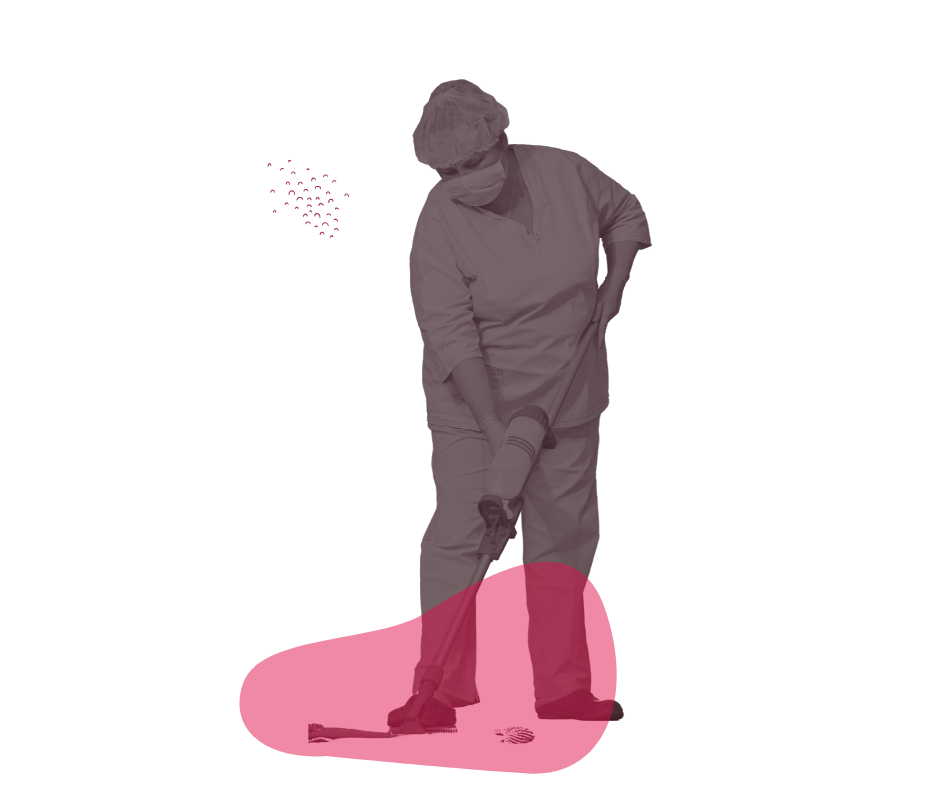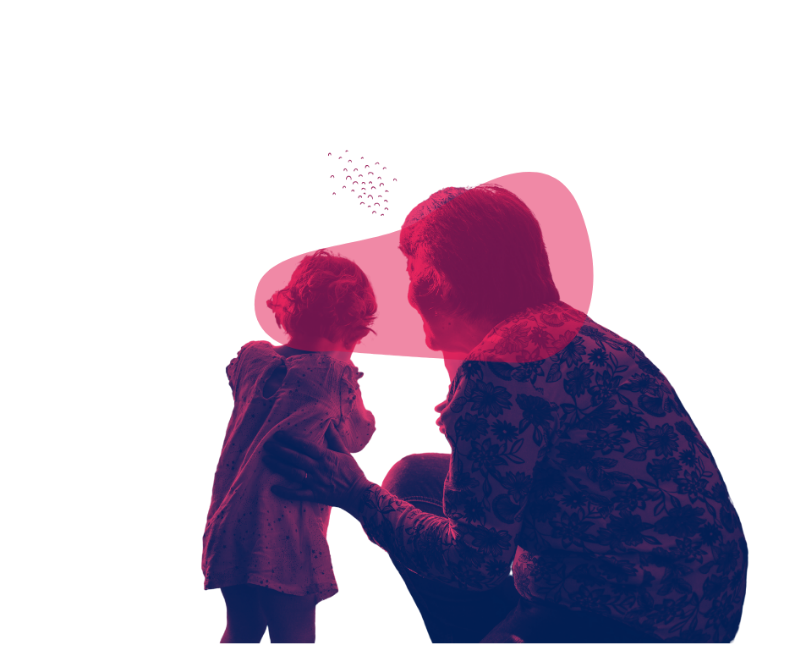This Economic Labour Hurts the Arch of Our Backs
A Feminist Economic Recovery Plan for COVID-19
To read the report as a PDF, please click here (PDF – 676 KB).
On this page:
- Introduction
- Recommendations
- Unpacking the “economic shutdown”
- COVID-19 impacts Indigenous women
- To diversify and reshape the economy we must…
- Conclusion
- Feminists Deliver Members
- Show your support
Land acknowledgment
Feminists Deliver is a coalition based in unceded territories in what colonially borders British Columbia, where the genocidal impacts of European colonizers span centuries and continue to haunt the realities of Indigenous peoples today including residential schools, the Sixties Scoop, as well as the governmental, religious and police authorities’ control of family systems, resources, and access to services. More than 200 distinct First Nations as well as Métis people, with at least 30 different languages and approximately 60 spoken dialects reflect the diversity of the peoples, cultures, and spaces we currently occupy.
Collectively, we also acknowledge the Indigenous peoples from the rest of colonial Canada as well as other nations, as we continue to struggle and rise together for the liberation of peoples that proponents of colonialism (including its effects of patriarchy, capitalism, heteronormativity, ableism to name a few) continue to oppress.
Please note
Throughout this document, we will be referring to Two-Spirit and non-binary people, and unless it is otherwise specified, “women and girls” include the following people:
- Indigenous women
- Black women
- Immigrant, Migrants, and Refugee women
- Women who communicate in languages other than English
- Trans women
- Lesbian women
- Women with disabilities
- Girls and young women
- Senior women
- Low-income women
- Girls/young women aging out of foster care
- Rural women
- Students
We would also like to mention that the term “intersectional feminism” is a term coined in 1989 by professor Kimberlé Crenshaw to describe how race, class, gender, and other individual characteristics “intersect” with one another and overlap.
We would like to acknowledge the excellent work of the Hawaiʻi State Commission on the Status of Women Department of Human Services in the State of Hawaiʻi for Building Bridges, Not Walking on Backs A Feminist Economic Recovery Plan for COVID-19. Their report inspired this document and has highlighted that the women’s struggle knows no borders, and solidarity amongst people with marginalized genders and the intersections they live within is necessary for just and equitable societies across the globe.
This document is inspired by “This Bridge Called My Back: Writings by Radical Women of Color,” a feminist anthology edited by Cherríe Moraga and Gloria E. Anzaldúa in 1981.
Introduction
There is no epidural to this economic labour weighing heavily on women’s backs.
 British Columbia prides itself on being a leader and example to Canada and the world in our measures to address and contain COVID-19. Now is an opportunity for BC to continue to build on this momentum and be just as proactive in the recovery plan.
British Columbia prides itself on being a leader and example to Canada and the world in our measures to address and contain COVID-19. Now is an opportunity for BC to continue to build on this momentum and be just as proactive in the recovery plan.
Two-Spirit and non-binary people, women and girls are largely missing from the discussions on COVID-19 recovery planning. Those experiencing the structural inequities that lead to poor health, are most significantly impacted by the health, economic, and social costs of COVID-19 and will have the least ability to “recover” in our current systems and institutional structures.
Government authorities must implement recovery strategies rooted in intersectional feminism, anti-oppression and decolonization to ensure we are all included and our needs are met. Leaders of the women’s movement must be at the recovery strategy tables.
This document represents a living and evolving agenda for a feminist COVID-19 response and recovery and is not exhaustive, definitive, or exclusively representative, and instead highlights key and emerging principles and recommendations.
Feminist anti-racist women’s leadership must be at the center of the COVID-19 response and recovery
The financial stresses are not only impacting the province; on a large scale, they are exacerbating the already established high risk of sexualized violence towards Two-Spirit and non-binary people, women, and girls with reports of increased domestic violence, sex trafficking, sexual harassment and coercion by landlords as well as violence towards community members who are Indigenous, Black, and people of colour, and 2SLGTBQI peoples.
In the 41st Parliament of British Columbia, 34 women were elected as Members of the Legislative Assembly (MLA). They represent only 39 per cent of the 87 seats in the BC Legislature and even less when considering the representation of Indigenous, Black, and women of colour. Although it is not enough to have women and racialized women in these positions, these MLAs also need to have the self-determination and the support of other MLAs to work towards dismantling systemic oppressions. Giving women and Indigenous, Black, and women of colour time and space to use their voices as well as power to confidently do their work from within the system is one of the many benefits of electing them into these positions of power.
Recommendations
Build a feminist anti-racist COVID-19 response and recovery plan
As government designs an economic impact recovery plan for COVID-19, it is fundamentally necessary, to include  disaggregated data collected, analyzed, and published with relation to gender, race/ethnicity, age, postal code, and social-economic status. Data collection must not be used to harm the groups of people it aims to help which can be avoided by allowing community to lead the data collection process and be provided tools and compensation to do so.
disaggregated data collected, analyzed, and published with relation to gender, race/ethnicity, age, postal code, and social-economic status. Data collection must not be used to harm the groups of people it aims to help which can be avoided by allowing community to lead the data collection process and be provided tools and compensation to do so.
To contain costs or enhance revenue, the Province should ensure there are no cuts to social services, including services for domestic violence and for maternal, sexual, reproductive, mental health, and child care.
To support, enhance and stimulate British Columbia’s economy, the Province should support displaced workers from the tourism and hospitality industries, retail, manufacturing and restaurant sectors who are predominantly racialized and low-waged women, by shifting and adjusting funds for re-training in sustainable sectors such as green jobs, trades and self-entrepreneurship.
In our view, we are not seeking “to return to normal” but to build bridges to a feminist future for British Columbia.
To honour the relationship with Indigenous peoples, decision makers must include Indigenous leaders and voices in the recovery plan and carefully consider, consult and take action on previous recommendations and calls to action such as:
- The Murdered and Missing Indigenous Women and Girls Inquiry Calls for Justice:https://www.mmiwg-ffada.ca/final-report/
- The Truth and Reconciliation: Commission of Canada: Calls to Action: http://trc.ca/assets/pdf/Calls_to_Action_English2.pdf
- The United Nations Declaration on the Rights of Indigenous People (UNDRIP): https://www.un.org/development/desa/indigenouspeoples/wp-content/uploads/sites/19/2018/11/UNDRIP_E_web.pdf
Unpacking the “economic shutdown”
COVID-19, and the measures being implemented to contain the virus are deeply affecting social and economic relationships in British Columbia and beyond. The curtain has been lifted and we are now seeing the emphasis on what we deem as “essential services.” The most precarious, low-paid occupations such as caregiving, food and delivery services that were once dismissed and unaccounted for are actually vital to how our systems work. The overdue recognition of this important work has yet to be accompanied by the financial compensation these workers deserve.
Status quo is not good enough and we should not “return to normal.” This recovery plan is an opportunity to rebuild the economy better than before with an emphasis on addressing the gaps that have come to light or that have always been in existence and not recognized as gaps: in healthcare, child care, education, affordable housing, public transit and gender-based violence resources. It is not only important to look at the impacts of these key areas, it is also vital to hear the recommendations of those with lived experience.
COVID-19 impacts Indigenous women
There has been a lack of understanding as to why consultation and proper procedure for Indigenous communities is necessary. Many First Nations are in tourism areas. An increase in visitors puts residents at greater risk of contact with COVID-19. There is also greater risk to health as many Indigenous women and families are more likely to live and work in rural communities that are targeted for toxic industries. Environmental racism contributes to the vulnerability of an already marginalized group with lack of access to healthcare, healthy food, public transit, affordable housing and other resources necessary for healthy living.
To diversify and reshape the economy we must:
 Fully incorporate support for community-led gender-based violence prevention in the immediate response and long-term recovery
Fully incorporate support for community-led gender-based violence prevention in the immediate response and long-term recovery
Reports have shown that women are experiencing an increase of domestic violence during COVID-19 due to home quarantine measures that expose women to their abusive partners. The essential community- based services of organizations such as Battered Women’s Support Services and Women Against Violence Against Women Rape Crisis Centre are in need of long-term sustainable funding to support victims and survivors during the next phases of the recovery plan.
Recovery stimulus funds are supposed to be neutral, but this is not possible in a gendered society without a thoughtful intersectional feminist plan. Upon building a caring economy out of the unsuccessful capitalist system, it is important to address systemic issues that need dismantling, repair and rebuilding. These issues include gender-based violence, economic insecurity, poverty, ableism, and racism.
Community-based services supporting survivors and victims of gender-based violence should be considered essential services as health care is. Core funding needs to be allocated to community-based organizations that play a crucial role in the prevention and intervention of ending violence against Two-Spirit and non-binary people, women, and girls.
Reorient our economy away from tourism and extraction, and towards a caring economy
British Columbia has moved quickly to open non-essential, leisure activities and it is arguable that this was due to our economy’s reliance on  the tourism industry. Proper consultation with First Nations bands is necessary to include the voices of those most impacted by this reopening.
the tourism industry. Proper consultation with First Nations bands is necessary to include the voices of those most impacted by this reopening.
Tourist destinations in BC are on unceded territories, and many attractions are further situated within predominantly First Nations communities; while a high percentage of tourism jobs are held by women. It would be economically responsible for the Province to recognize this heavy reliance on tourism and identify retraining opportunities for women to enter into “green jobs” in renewable energy, energy efficiency and trades.
Anecdotal evidence speaks to women being “the last hired and the first fired” when speaking of trades jobs. Women have been at the top of the layoff list although construction has not shut down in BC during COVID-19. Indigenous women make up eight per cent of women in trades and are highly represented in this sector, in relation to the overall Indigenous population of BC. Hairdressing is also a trade highly representative of women and a service industry that was shut down. Thus, women have been economically negatively impacted at higher rates than men due to layoffs or shut down of service areas. In recognition of the high representation of women in trades, implementing an economic stimulus directed specifically towards women would be a reasonable move by government.
Redress critical economic inequities to promote women’s financial independence, which is a basic condition for recovery and liberation from gender-based violence
Raise the minimum wage to a living wage (beyond the $19.50/hour Metro Vancouver for a two-person income to a single mother’s living wage); improve income assistance rates; respond to the demands for migrants’ rights including recognizing foreign credentials, full status for all, providing paid sick days and paid family leave; restructure and decolonize the regressive colonial tax system; develop innovative programs to end homelessness, and adapt the “affordable housing” percentages to be reflective of low income and not of housing market prices. We support the recommendations of the BC Poverty Reduction Coalition and we ask that you implement them.
Support displaced workers through an adjustment fund for re-training and professional mobility
Increases to living wages especially for those in precarious employment situations such as tourism, retail, and caring sectors (including caregiving, child care, and health care workers) will ensure better standards of living and social determinants of health outcomes. When employment is no longer an option due to recession, funding, re-training, and diverse sector jobs will help improve rates of under and unemployment.
Fund social entrepreneurship approaches to new economic investment in women entrepreneurs by individuals, groups, social enterprise, and start-up companies
This will give opportunity for those who have suffered economic hardship to financially bounce back and with stability move forward for the long term. Building economic capital for Indigenous, Black, and women of colour beyond the ideas of capitalism as it exists and move into an equitable “new normal” with the social capital of interpersonal relationships, shared sense of identity, shared understanding, trust, cooperation, and reciprocity, will give not only economic prosperity but also greater empowerment and sense of identity.
In addition, there is a need for increased support and investment in social entrepreneurs, social cooperatives, and social enterprises. Many innovations have been led by women and by Black, Indigenous and People of Colour, who have been demonstrating sustainable models for a more inclusive economy for many years.
The Province should enhance women, sexual, and gender minorities’ access to capital outside the commercial sex industry and women’s access to jobs in male-dominated industries: green-technologies and trade jobs. In order to support this access, the government needs to hear the voices calling for an end to gender segregation. The number of women in trades has not changed in decades and there is an opportunity to address this through funding models, retraining opportunities, and emphasis on removal of “boys club” cultural norms and access to well-paid jobs.
The government will benefit from new economic thinking by funding feasibility studies on economic alternatives that enhance social wellbeing as an economic priority and center Two-Spirit-, non-binary-, and women-led experiences, ideas, and organizations.
Stimulate specific sectors to shift the re-training from the projected recession fields of work and include women just over the age of what is considered youth (18 to 29 years old). There are a variety of circumstances that lead Black, Indigenous, and women of color to hospitality, retail, tourism and low-wage jobs. When women seek support in re-training in a different sector or management training, they often have aged out of financial support services such as grants and no-cost training opportunities often offered to what is considered the youth demographic.
Build the Province’s social infrastructure (child care, housing, public transit)
Child care
Before parents with young children can return to work, they need access to affordable child care programs that meet diverse needs, are culturally relevant, and offer non-traditional hours of care for shift and part-time workers. This is not only necessary to get parents back to work, it is also beneficial as “multiple economic studies show that child care is one of the biggest job creators: investing $1 million in child care creates almost 40 jobs” (BC Budget 2021 CCCABC). This can be achieved by expanding the $10-a-Day child care sites across BC, implementing a competitive wage grid for early childhood educators, and funding new publicly managed child care spaces in every BC community.
Housing
Before COVID-19, British Columbia was already impacted by an affordable housing crisis where women were disproportionately affected. During the pandemic, shifts in employment and financial stability amplified how delicate housing affordability is within the BC economy, leaving many residents—on top of people who already marginalized—feeling the impacts of housing insecurity.
Those with precarious employment, underemployment, low income, experiencing homelessness, and those trying to escape abusive relationships are going to need government action to build suitable, safe and affordable housing in the economic recovery plan to avoid higher levels of distress in our pre-existing housing crisis. This includes a call for sufficient robust investment to end homelessness.
Public Transit
Access to public transit for many Two-Spirit and non-binary people, women and girls also provides another level of safety. A prime example is the “Highway of Tears” and the impacts that lack of transit has had on murdered and missing Indigenous women and girls in northern BC. Decision makers can support transit access in the recovery plan by building transit access for northern BC and by implementing the All on Board calls to action as follows:
- Free transit for youth
- Sliding scale based on income
- Remove fare evasion ticketing and policing on public transit
Provide free, universally accessible contraceptive of choice
Three hundred and forty million dollars; this is the cost estimated by Dr. Wendy Norman and her team at CART (Contraception and Abortion Research Team) of unplanned pregnancies in Canada. Added to that, eighty-two per cent ($279M) was attributed to contraceptive non-adherence, creating good economic reasons to ensure choice. CART researchers also confirm that low-income people who can be pregnant are the greatest at risk of unplanned pregnancies because the more effective a contraceptive method is, the more expensive it is. The United Nations confirms that access to contraception is a basic human right and yet many communities in British Columbia do not have physicians or nurse practitioners willing to provide this medical service.
Provide stable funding to community services
 The services provided for the children and families were essential and did not come to a complete stop, however, they were impacted with reduced access and by the resources available. Parental and family support services such as drop-in programs, prenatal/postnatal programs, parenting programs, mental health support, drug, and alcohol recovery services, transition housing, low-income housing, and food security programs, are all essential to consider when the government is funding long-term recovery action. Stable funding to support community services that work cohesively with the Ministry of Child and Family Development is a necessity. This funding would ensure individuals and families already vulnerable to economic changes have some foundation of support as BC navigates its way through the recovery plan.
The services provided for the children and families were essential and did not come to a complete stop, however, they were impacted with reduced access and by the resources available. Parental and family support services such as drop-in programs, prenatal/postnatal programs, parenting programs, mental health support, drug, and alcohol recovery services, transition housing, low-income housing, and food security programs, are all essential to consider when the government is funding long-term recovery action. Stable funding to support community services that work cohesively with the Ministry of Child and Family Development is a necessity. This funding would ensure individuals and families already vulnerable to economic changes have some foundation of support as BC navigates its way through the recovery plan.
Conclusion
Although there have been many aspects of this pandemic that brought people together with “physical distancing and social connection,”  COVID-19 further exacerbated the glaring inequities brought on by white supremacy, heteropatriarchy, capitalism, classism, ableism, and sexism. There is now a growing understanding and appreciation of the value and need for well-funded, accessible public services. The impacts of COVID-19 are intersectional. Although the virus itself does not “discriminate,” it disproportionately impacts those who are already forced to live on the margins. It is incumbent on the BC Government to use a gendered intersectional lens on their recovery strategies to ensure we are all included. Leaders of the women’s movement must be at the recovery strategy tables.
COVID-19 further exacerbated the glaring inequities brought on by white supremacy, heteropatriarchy, capitalism, classism, ableism, and sexism. There is now a growing understanding and appreciation of the value and need for well-funded, accessible public services. The impacts of COVID-19 are intersectional. Although the virus itself does not “discriminate,” it disproportionately impacts those who are already forced to live on the margins. It is incumbent on the BC Government to use a gendered intersectional lens on their recovery strategies to ensure we are all included. Leaders of the women’s movement must be at the recovery strategy tables.
The response of those who live in BC to COVID-19 has presented us a silver lining: when we are facing troubling times, many residents stepped up to support each other. They did so emotionally, mentally, spiritually, and financially through the stress; building strong networks of a caring and compassionate community. As evidence of this, the community has stepped up to speak out and call for action against racism towards Black, Indigenous, and People of Colour. British Columbia’s recovery should be built on this momentum. It gives hope that with decision-makers continuing to act on evidence, listening to the voices of those most impacted by COVID-19, and looking to community for leadership there is opportunity to turn that care into a caring economy.
Feminist Deliver Membership include:
- Aboriginal Mother’s Centre
- Atira Women’s Resource Society
- Aunt Leah’s Place
- Battered Women’s Support Services
- BC Association of Aboriginal Friendship Centres
- Butterflies in Spirit
- Central City Foundation
- Chrysalis Society
- Cicely Blain Consulting
- Coalition of Child Care Advocates of BC
- Downtown Eastside Women’s Centre
- First Nations Health Authority Culture Saves Lives
- Hogan’s Alley Society
- Hummingbirds Rising Consulting
- Ishtar Women’s Resource Society
- Justice for Girls
- Kamloops and District Elizabeth Fry
- March On Vancouver
- New Chelsea Society
- Options for Sexual Health
- Pacific Association of First Nations Women
- Pacific Immigrant Resources Society
- RainCity Housing
- Réseau-Femmes Colombie-Britannique
- Rise Women’s Legal Centre
- Surrey Women’s Centre
- Talking Dog Communications
- Union of British Columbia Indian Chiefs
- Vancouver Aboriginal Community Policing Centre
- Vancouver Women’s Health Collective
- Victoria Women’s Transition House
- West Coast LEAF
- WISH Drop-in Centre Society
- WAVAW Rape Crisis Centre
- Women Refugees Advocacy Project
- Women Transforming Cities
- YWCA
Copy and paste the email below
Dear
Thank you for your dedication and time and adhering to the values of being here to protect people’s health and give immediate relief during the COVID-19 pandemic. Keeping in close contact with community leaders will not only ensure the steps are working but will also support building trust and hopefully maintain a good working relationship with those most impacted by this pandemic.
As you know, those who live in British Columbia had been impacted differently by the COVID-19 pandemic. Although the virus itself does not discriminate, it disproportionately impacts those who live on the margins.
Feminists Deliver is an intersectional, anti-oppressive and decolonial grassroots collaboration of BC-based Two-Spirit people, non-binary folks, Indigiqueer, Trans women, Lesbian women, cis women and girls, and the organizations that support them.
I am writing to you today to show my support for the Feminists Deliver document, “This Economic Labour Hurts the Arch of our Backs” A Feminist Economic Recovery Plan for COVID-19, which was put together by a grassroots collaboration that encompass over 30 organizations that serve community in a variety of ways. This representation is very important to me during this economic recovery plan and I have two requests:
– Take action towards implementing the document recommendations
– Set a time to meet with Feminists Deliver representatives
Thank you for your time and for your commitment to keeping BC is inclusive and respectful of people of all genders, ethnicities, cultures, and faiths and their contributions to our collective wellbeing.
Respectfully,
YOUR NAME
YOUR POSTAL CODE
British Columbia Resident
